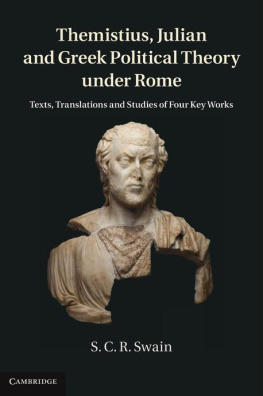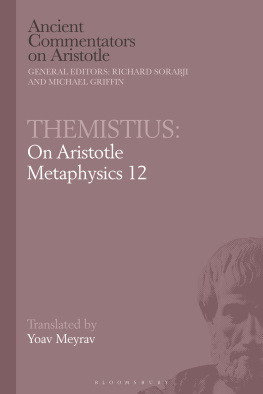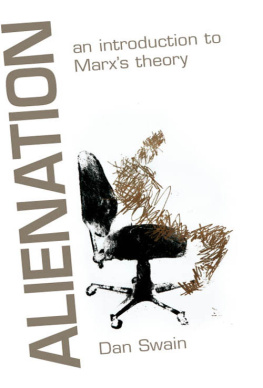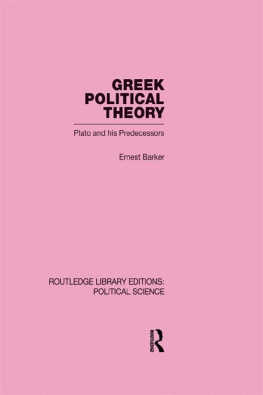Simon Swain - Themistius, Julian, and Greek Political Theory under Rome
Here you can read online Simon Swain - Themistius, Julian, and Greek Political Theory under Rome full text of the book (entire story) in english for free. Download pdf and epub, get meaning, cover and reviews about this ebook. publisher: Cambridge University Press, genre: Religion. Description of the work, (preface) as well as reviews are available. Best literature library LitArk.com created for fans of good reading and offers a wide selection of genres:
Romance novel
Science fiction
Adventure
Detective
Science
History
Home and family
Prose
Art
Politics
Computer
Non-fiction
Religion
Business
Children
Humor
Choose a favorite category and find really read worthwhile books. Enjoy immersion in the world of imagination, feel the emotions of the characters or learn something new for yourself, make an fascinating discovery.
- Book:Themistius, Julian, and Greek Political Theory under Rome
- Author:
- Publisher:Cambridge University Press
- Genre:
- Rating:5 / 5
- Favourites:Add to favourites
- Your mark:
- 100
- 1
- 2
- 3
- 4
- 5
Themistius, Julian, and Greek Political Theory under Rome: summary, description and annotation
We offer to read an annotation, description, summary or preface (depends on what the author of the book "Themistius, Julian, and Greek Political Theory under Rome" wrote himself). If you haven't found the necessary information about the book — write in the comments, we will try to find it.
Simon Swain: author's other books
Who wrote Themistius, Julian, and Greek Political Theory under Rome? Find out the surname, the name of the author of the book and a list of all author's works by series.
Themistius, Julian, and Greek Political Theory under Rome — read online for free the complete book (whole text) full work
Below is the text of the book, divided by pages. System saving the place of the last page read, allows you to conveniently read the book "Themistius, Julian, and Greek Political Theory under Rome" online for free, without having to search again every time where you left off. Put a bookmark, and you can go to the page where you finished reading at any time.
Font size:
Interval:
Bookmark:
THEMISTIUS, JULIAN, AND
GREEK POLITICAL THEORY UNDER ROME
Themistius close relationship with Christian emperors from Constantius to Theodosius makes him one of the most important political thinkers and politicians of the later fourth century, and his dealings with Julian the Apostate have recently attracted much speculation. This volume presents a new critical edition, translation, and analysis of Themistius letter to Julian about kingship and government, which survives mainly in Arabic, together with texts, translations, and analyses of Julians Letter to Themistius and Sopaters Letter to Himerius. The volume is completed with a text, translation, and analysis of the other genuine work of Greek political theory to survive in Arabic, the Letter of Aristotle to Alexander, which dates from an earlier period and throws into relief the particular concerns of Themistius, Julian, and the rulers of the fourth-century Roman world.
SIMON SWAIN is Professor of Classics and Chair of the Faculty of Arts at the University of Warwick. He is the author of a number of well-known studies of the Greek literature of the Roman period, including most recently Economy, Family, and Society from Rome to Islam (Cambridge University Press, 2013).
THEMISTIUS, JULIAN, AND
GREEK POLITICAL THEORY
UNDER ROME
Texts, Translations, and Studies of Four Key Works
SIMON SWAIN


University Printing House, Cambridge CB2 8RU, United Kingdom
Published in the United States of America by Cambridge University Press, New York
Cambridge University Press is part of the University of Cambridge.
It furthers the Universitys mission by disseminating knowledge in the pursuit of education, learning and research at the highest international levels of excellence.
www.cambridge.org
Information on this title: www.cambridge.org/9781107026575
Simon Swain 2013
This publication is in copyright. Subject to statutory exception and to the provisions of relevant collective licensing agreements, no reproduction of any part may take place without the written permission of Cambridge University Press.
First published 2013
Printed in the United Kingdom by CPI Group Ltd, Croydon cr0 4YY
A catalogue record for this publication is available from the British Library
ISBN 978-1-107-02657-5 Hardback
Cambridge University Press has no responsibility for the persistence or accuracy of URLs for external or third-party internet websites referred to in this publication, and does not guarantee that any content on such websites is, or will remain, accurate or appropriate.
Table of Contents
Acknowledgements
Many people make a book. Of those who have been particularly helpful, I shall mention only Eva Mussio, Harry Munt, Uwe Vagelpohl, IgnacioSnchez, and Elvira Wakelnig, all of whom assisted greatly with the texts and translations. Neil McLynn, Kevin Butcher, and others, together with the readers for CUP, offered valuable encouragement, advice, and proper criticism on other aspects. I am extremely grateful to Bert Smith for his help in supplying the cover picture of the splendid late fourth-century intellectual from Aphrodisias. Special thanks as ever go to my family.
Introduction
This volume presents texts, translations, and studies of four works of Greek political theory from the time of the Roman Empire. It is built around Themistius Letter to Julian, a work of political advice and praise dating to the middle of the fourth century, which survives in a complete form only in Arabic translation. Themistius Letter to Julian cannot be studied aside from Julians own Letter to Themistius on the responsibilities of power, and this is the second major text treated in this volume. To set the scene for these works I shall discuss a more standard political letter of the 340s or 350s, Sopaters Letter to Himerius, on his brother Himerius responsibilities as a new governor. Finally, in the Appendix I shall complement the Letter to Julian by examining the only other genuine Greek treatise of political thought and advice to have been translated into Arabic, the Letter of Aristotle to Alexander, which appears to date to the period of the High Roman Empire and is wholly lost in Greek. The studies around these four works touch on politics and political thinking in general but are not in any way designed to constitute a history of Greek political literature in the Roman period. The focus is rather on the texts at hand and particularly on aspects of the career of Themistius and his relationship with Julian.
Advice to those in power was a long-established part of the Greek literary tradition. A body of rulership literature was apparently already available by the start of the third century BC, when Demetrius of Phalerum recommended King Ptolemy to acquire and read books on kingship and leadership on the ground that the things courtiers are not brave enough to recommend to kings are written in books. and made it into a guide of how to be the best man and the best ruler. The Evagoras self-consciously shows that the choice of topics to be included for praise and recommendation was especially significant for the speaker and the honorand, and this continued to be an important factor in determining the usefulness of the treatment as a model. The codification of good, virtuous behaviour by the classical Greek philosophers lent the literature of advice and praise an intellectual resource that joined forces with the idealizing techniques pioneered by Isocrates and others and made King Ptolemys bedside reading both appealing and instructive.
Roman rule invigorated the Hellenic tradition by introducing the need to address a large number of governors or emperors who were, initially at any rate, not Greek but whose education in Greek allowed them to appreciate or at least understand Hellenic values and ideas of how rulers should conduct themselves and be proud of it. For Roman audiences, advice and encomium remained part of the same spectrum. The classicizing culture of antiquity ensured that foundational works of rulership literature such as Isocrates Evagoras, To Nicocles, Nicocles or The Cyprians and Xenophons Agesilaus continued to be read and imitated both because of these authors abiding importance in the educational system and because they conveyed to each generation afresh the message of how to be a good leader. Xenophons agreeable picture of the Persian prince Cyrus the Greats upbringing, deeds, and kingship was another enduring classic, combining encomium, biography, and historical romance to make a portrait of a popular and successful ruler that, as Ausonius tells its long-dead author, you could discern in our Gratian, if you could only step forward to todays time.
The remaining parts of the late Hellenistic text that has attracted most attention, Philodemus On the Good King According to Homer, show that it dealt with criticism of Homer more than kingship (Asmis 1991). At least we have (most of) Philos important but understudied treatments of the Patriarchs (especially On Joseph, or the Life of the Politician and the Life of Moses), which join other examples such as the questions on kingship at the banqueting scene in the Letter of Aristeas or Polybius aside on kings and tyrants at Histories 5. 1011 to alert us to the range and purposes of the catalogue of themes in the Hellenistic backlist.
The literature of the classical and Hellenistic eras naturally had a great influence on the ideas and in some cases the structure of rulership literature at Rome, as we see in well-known works like Senecas
Next pageFont size:
Interval:
Bookmark:
Similar books «Themistius, Julian, and Greek Political Theory under Rome»
Look at similar books to Themistius, Julian, and Greek Political Theory under Rome. We have selected literature similar in name and meaning in the hope of providing readers with more options to find new, interesting, not yet read works.
Discussion, reviews of the book Themistius, Julian, and Greek Political Theory under Rome and just readers' own opinions. Leave your comments, write what you think about the work, its meaning or the main characters. Specify what exactly you liked and what you didn't like, and why you think so.










